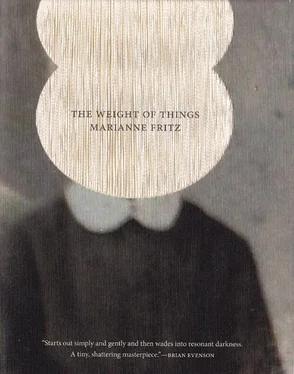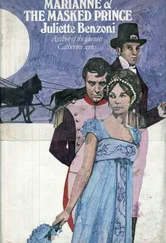The Wise Little Mother twiddled her thumbs and said nothing.
“If I may ask the Wise Little Mother’s opinion. Could it be that the molding hands of life disfigured them once it was over? I’m only wondering. Could it be that the molding hands of life outwitted me? Is that something we should consider?”
The Wise Little Mother folded her hands and ardently prayed her “Hail Mary, full of grace …”
The a-man-a-word-and-then-you’re-lost Berta had really believed that the only thing she needed was to get the Madonna necklace back from the fortress depository, after which she’d be able to figure out whether or not the molding hands of life had played a filthy trick on her. Or perhaps she simply needed the Madonna trinket as a barrier to shield her from what she’d seen as she carried out her deed.
But even once she had it, a-man-a-word-and-then-you’re-lost Berta had still never mastered the inwardly turned gaze she had believed was her only means of finally triumphing over the molding hands of life. Only when she hung her Madonna around Wilhelmine’s neck did her doubting and brooding compulsion fall away from her like withered autumn leaves, and then she understood that she had lost, and that life, with its molding hands, the weight of things, had won. Was the longing still there, and the burning silence? Giggling Berta’s inward gaze gave no indication one way or the other. Only on occasion did the thing the old woman called the wound of life still flare up in Berta’s eyes.
A NEW RESPONSIBILITY FOR THE WISE LITTLE MOTHER
The old woman, well schooled in all that pertained to the wound of life , had seen straight through the events of 13 January, 1963.
“There’s no doubt about it. The wound of life is challenging me, trying to step in and hinder Berta’s recovery.”
Putting a stop to this was her most sacred duty, and to that end, she philosophized away that particular day and its lamentable events, until finally they seemed like a mere trifle. But trifles of this kind still damaged the fortress, creating the impression it was nothing more than the inevitable result of an upbringing that had failed out there in that Sodom and Gomorrah world, where the wound of life holds court and Babylon founders. And this was a terrible affront to the fortress’s edifying work, its mission of scrupulously cultivating sainthood, which it carried out in the most exemplary manner.
In other words: the old woman would not stand for a challenge to her merit with respect to Berta, for whom she felt great responsibility, as if she herself had borne her. No, she would not be defied by the wound of life , which had crept its way so shamelessly into Ward 66.
On January 14, 1963, the Wise Little Mother stood witness to Berta’s final deliverance, a responsibility the old woman accepted with great solemnity.
On January 14, 1963, Berta washed the man, the word, and all her lostness out of her life. This is according to the words of the old woman who watched her do it.
Berta stood at the sink and washed herself slowly and deliberately. Then a-man-a-word-and-then-you’re-lost Berta swam down the drain with the sweat from yesterday’s nightmare and into the fortress’s sewers.
“This is your awakening, Berta dear, a blessing from our fortress. Here is where you sweat out life, that awful dream. Isn’t that true, Berta dear? That life is no more than an awful dream?”
Berta giggled.
“Yes. Indeed. Guilt cries out from this dream. Indeed. The dream never leaves you in peace, it forces visitations on us, it never frees us from guilt. Everywhere we turn it confronts us with Sodom and Gomorrah. Say it now, Berta dear: the visitation has passed, the terrible dream is washed away, the colossus of life has been toppled. There is no more Sodom and Gomorrah, no more guilt, and no more dream.
“It is true, Berta dear. Yes. Indeed. The fortress has heeded your wishes. It is speaking to you now. It speaks to you before God and the saints. They hold the keys to your redemption. Yes. Indeed. Hear us now, Berta Schrei. You have been chosen for eternal peace. I bless you: Ego te absolvo. ”
Berta giggled.
“Dear Berta, you owe this to the fortress. The fortress alone listens to you. It alone loves you. It understands you. It feels what you feel. It speaks for you before God and the saints.”
Berta giggled.
AFTERWORD. On Marianne Fritz
Of all the crooked arrows in the critic’s quiver, the one labeled “genius” seems to fly most erratically. Rather than a substantive gesture of praise, in its normal application it tends to serve as an aggrandizement of the critic himself, who thereby claims the capacity to appreciate this ethereal property. Yet beyond able craftsmen of the Richard Ford stamp or crowd-pleasers whose affability calls their integrity into question, there is a class of artists whose work is so strange and extraordinary that it eschews all gradations of the good and the mediocre: genius and madness are the only descriptors adequate to its scale.
Such is the case of the Austrian novelist Marianne Fritz (1948–2007), whose work is little known outside a small but fervent circle of admirers. Praise, though scant, is neither tepid nor inconsiderable: from 1978, when she received the inaugural Robert Walser Prize for the unpublished manuscript of The Weight of Things , her first novel, to her winning the highly prestigious Franz Kafka Prize in 2001, her writing was repeatedly honored with awards and stipends. Regarding Naturgemäß 1, Fritz’s unfinished magnum opus, Elfriede Jelinek commented, “It is a singular work, before which one can do nothing but stand, like a devout Muslim before the Kaaba.” W. G. Sebald also dedicated to her a section of the late poem “In Alfermée.” Here the image of Fritz working through her exhaustion, “one hand on the keys of her machine,” recalls the passage in The Rings of Saturn on the melancholy of scholars and weavers, “harnessed to the machines we have invented.”
A contrasting view was held by Thomas Bernhard, who addressed his esteemed publisher, Siegfried Unseld, with characteristic charm in 1986:
Before my departure I have had another glance at your recent publishing catastrophe: the 3,000 pages you have had printed and allowed to appear are the greatest embarrassment I have been acquainted with to this day. To print and bind over 3,000 pages of mindless proletarian trash with all the bombast of a centenary event belongs, quite frankly, in the record books: as a world record of stupidity. I am not speaking so much of the begetter of this idiocy, but of the fact that the publisher has handicapped himself by releasing this fatuous vulgarity.
The project that inspired these extremes of reverence and ridicule began with The Weight of Things , which was followed two years later by The Child of Violence and the Stars of the Romani. Whereas The Weight of Things covered the years 1945–1963, in her second novel Fritz would approach the period she saw as the key to understanding the disaster of Western civilization: the years surrounding the First World War. The action of the book centers around Kaspar Zweifel, a sensitive young man who dreams of moving away to America. In 1914 he loses his beloved and is sent away to fight for the Austro-Hungarian army in the suicidal battles on the Isonzo front in present-day Slovenia. When he returns to the village of Gnom, he takes over his father’s farm, makes a conventional marriage, and begins to complain of the “mongrelization” of the Austrian countryside. One night, drunk, he rapes a gypsy woman, and she and her community flee the area in fear of further violence. The woman returns in June of 1923 to leave Zweifel’s child in the village parish house.
Читать дальше











